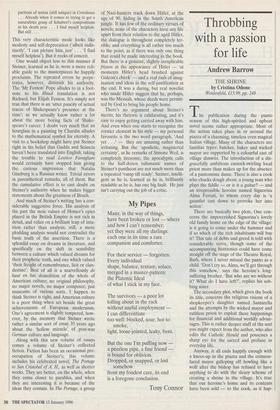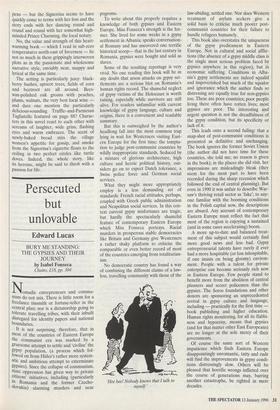Throbbing with a passion for life
Andrew Barrow
THE SHRINE by Cristina Odone Weidenfeld, £15.99, pp. 248 The publication during the panto season of this high-spirited and upbeat novel seems rather appropriate. Most of the action takes place in or around the piazza of a charming, timeless even magical Italian village. Many of the characters are familiar types: butcher, baker and wicked mayor are supported by a colourful cast of village dimwits. The introduction of a dis- gracefully ambitious cassock-swirling local priest more than makes up for the absence of a pantomime dame. There is also a cook who chucks dough about, a young man who plays the fiddle — or is it a guitar? — and an irrepressible heroine named Signorina Alma Ferrati, to whom every day is 'a gauntlet cast down to provoke her into action'.
There are basically two plots. One con- cerns the impoverished Signorina's lovely old family home on the edge of the village: is it going to come under the hammer and if so which of the rich inhabitants will buy it? This tale of debts and greed is told with considerable verve, though some of the accompanying histrionics could have come straight off the stage of the Theatre Royal, Bath, where I never missed the panto as a child. 'Don't cry so, Alma, we'll get through this somehow,' says the heroine's long- suffering brother. 'But who are we without it? What do I have left?', replies his sob- bing sister.
The secondary plot, which gives the book its title, concerns the religious visions of a shopkeeper's daughter named Santarella and the attempts by the wicked mayor and ruthless priest to exploit these happenings for financial and additional worldly advan- tages. This is rather deeper stuff of the sort you might expect from the author, who also edits the Catholic Herald and possesses a sharp eye for the sacred and profane in everyday life.
Anyway, it all ends happily enough with a knees-up in the piazza and the crimson- faced mayor galloping off howling like a wolf after the bishop has refused to have anything to do with the sleazy scheme of creating a shrine in the village. It's true that our heroine's home and its contents have been sold — to the cook, as it hap- pens — but the Signorina seems to have quickly come to terms with her loss and the story ends with her dancing round and round and round with her somewhat high- minded Prince Charming, the local notary.
No, the value and strength of this heart- warming book — which I read in sub-zero temperatures north-east of Inverness — lie not so much in these grippingly interwoven plots as in the passionate and wholesome narrative style, enviably neat, snappy and lyrical at the same time.
The setting is particularly juicy: black- berry bushes, apricot trees, fields of corn and beetroot are all around. Bees- wax-polished oak groans with peaches, plums, walnuts, the very best local wine and dare one mention the particularly delicious-sounding Truffle- and-Parmesan Tagliatelle featured on page 88? Charac- ters in this novel react to each other with screams of laughter, wide grins, flashing eyes and warm embraces. The scent of newly-baked bread stirs the village women's appetite for gossip, and smoke from the Signorina's cigarette floats to the ceiling in two perfect circles like turtle doves. Indeed, the whole story, like its heroine, might be said to throb with a passion for life.







































 Previous page
Previous page